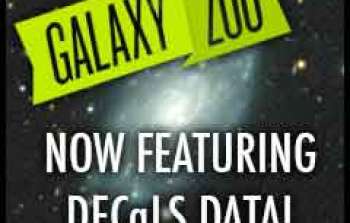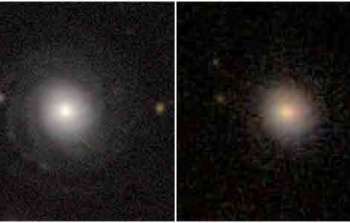sci15006 — Announcement
DECaLS Galaxies Now in Galaxy Zoo
November 30, 2015
The citizen science project Galaxy Zoo and the Dark Energy Camera Legacy Survey (DECaLS) have launched a new scientific collaboration. Since September 2015, images from the first data release of DECaLS (DR1) have been hosted at Galaxy Zoo, where volunteer members of the public can classify galaxy morphologies and help untangle the history of galaxy formation. More than half a million classifications of DECaLS images have been carried out to date.
Designed to be significantly deeper and to have better image quality than the earlier Sloan Digital Sky Survey (SDSS) or Pan-STARRS surveys, DECaLS will cover 6700 square degrees of extragalactic sky using the Dark Energy Camera on the 4-m Blanco telescope. Because of their superior image quality, the DECaLS images reveal critical details not apparent in SDSS images, such as tidal tails and extended debris of stars and gas stripped off galaxies by mergers or interactions.
The collaboration aims for a total of 1.3 million classifications of DECaLS images (40 per image) to compare the morphologies inferred from DECaLS and SDSS images of the same galaxies. The results will provide clues to the roles of low-luminosity galaxies and minor mergers in galaxy evolution.
New images from DECaLS will continue to be incorporated into Galaxy Zoo over the next several years as the survey is completed. The Zooniverse, which operates Galaxy Zoo, is the largest set of citizen science projects in the world, with more than 1.4 million users across a wide range of research disciplines.
Questions about the DECaLS + Galaxy Zoo project may be addressed to Kyle Willett (University of Minnesota; willett@physics.umn.edu).
Contacts
University of Minnesota
willett@physics.umn.edu
About the Announcement
| Id: |
ID
sci15006
|

